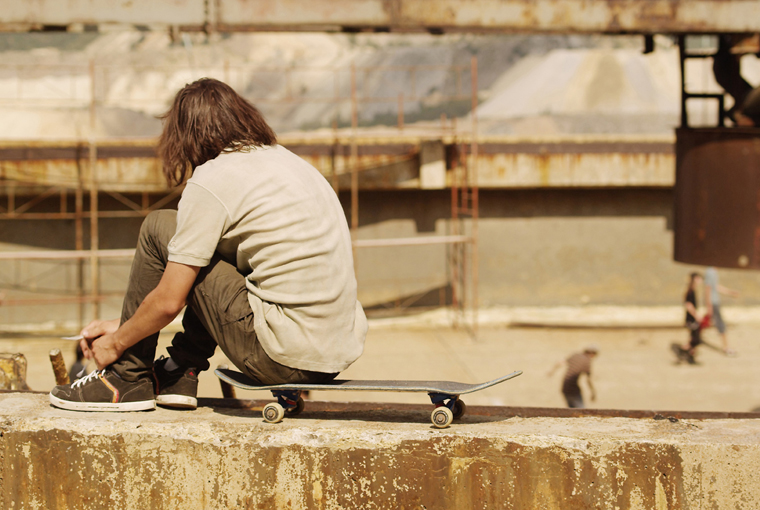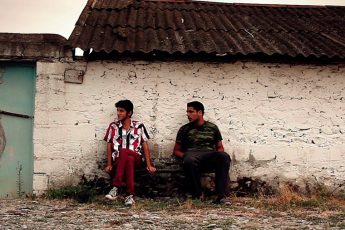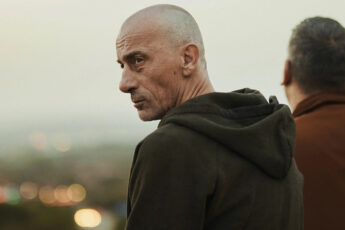
Most of Nikola Ležaić’s first feature Tilva Ros centers around the triangular relationship between Toda, Stefan, and Stefan’s girlfriend Dunja. They just finished high-school and spend the summer with their skater friends doing self-destructive stunts – whipping, burning, piercing, beating, going naked in a field of nettles – which they record on video to share with like-minded people on the net.
“Tilva ros” means “red hill” in Vlachian, but in the movie it describes a deserted copper mine where the teenagers hang out to film their pranks and occasionally to skate in the ruins of the left-over infrastructure. The only red element in this rather monotone gray landscape comes from the blood of one of the teenagers, Toda, whose masochistic games usually end up in the hospital.
Most of the members in Toda’s clique are in their early twenties, and – having finished school – are eager to get out of Bor. Stefan apparently passed the entry exam to study in Belgrad after summer, and Dunja just came back from France but will return there in the fall. This turns Toda into a frustrated left-over and might explain why he is also most enthusiastic about the pranks. Toda clearly likes being humiliated even when he is not being filmed. At one point, he provokes getting beaten by the owner of a club, and later by his father. In both occurrences he doesn’t resist, but appears to enjoy the violence that the two elder men use against him.
It is unclear what exactly motivates the teenagers to hurt each other, and what is at the source of Toda’s self-destructive behavior. The director only hesitatingly hints at explanations – one of them being boredom. There is obviously not a lot to do in Bor, and the employment situation is as exciting as the “red hills” of the surrounding copper mines. Forced by the local authorities to get a job in order to maintain his health insurance, Toda visits a seminar where they school people in how to find work. But he obviously doesn’t want to find a job, confronting his supervisor with a sarcastic attitude.
What does Toda want? If he wants things to stay as they were, the film does not depict Toda’s struggle with change. If, on the contrary, he would like things to change, the film doesn’t show how Toda would like things to change. Finally, if he doesn’t know what he wants, the film also refuses to depict Toda’s fight with indecision. What does Toda want? Toda’s problem is symptomatic for many new Balkan films. Recent Balkan films want change, but get stuck on the way. They try to find new meanings for contemporary life, and different styles to express that life, but end up looking like something already known. There are at least two reasons for this kind of stagnation. The first is that most contemporary films from the Balkan are overly Westernised, which is also the reason why they look so familiar. Even if there are no particular expectations attached to seeing a Balkan film (unlike, say, a Hollywood action film that looks familiar for obvious reasons, and whose raison d’être might even be to look familiar…), recent Balkon films are like inappropriate déjà-vus. Precisely what is Tilva Ros, if not a twisted version of MTV’s Jackass? On the other hand, how can one possible find a new identity, and a distinguished identity too, if one depends on the expressive means of foreign mass media?
The irony, is of course, that there is no Western aesthetics, so being over-Western or over-Eastern, as the same goes for Eastern aesthetics, is already one presupposition too many. It is only the attempt at being like a “western” film or being like an “eastern” film that establishes false categories where classifications of values and types previously did not matter. Tilva Ros, in trying to be like a “Western” film – Jackass or whatever it is – sets up an ideal that hasn’t been there before. But the same thing happens the other way round. That’s why Western films about Eastern Europe are, ironically, exactly the same as their counterparts. Both meet, in somewhat comical efforts to convey “otherness”, on the same fantastical grounds of that precise otherness. Take As if I Am Not There (2010) or Look, Stranger (2010) as examples, two war-films made by Western directors. Both of these films try to trace back the emotions of two victims of war, but these emotions get lost on the way. Why? Because they treat what they depict too seriously, in a somewhat over-earnest idealization of how a person in a war might feel at his worst. But this remains, against what it tries to be, a caricature. Here, as with the over-Westernized Eastern films, the main problem is respect. Why should a foreign victim of war feel deeper than a familiar one? If one looks at a “real”, non-other, film about war, one might actually find that there is, despite everything, quite a lot to laugh about. Who was not amused by Don Pietro in Rome, Open City?
The downside of this is that recent Eastern Films also depict that kind of over-earnest “otherness” regarding themselves. Take Aida Begić’s 2008 film Snow, where a woman tries to help her abandoned village survive the aftermath of the Bosnian War. Upper voice piano melodies and postcard-like images give this film an awkward sense of déjà-vu, as if it wants to justify itself by adding an other musical score (which, of course, sounds like any other – much the same), and using other visual means: smooth, almost creamy, high-contrast images (which makes it look like TV-commercials). The opportunity, surely more precious in Eastern Europe than in the West, to shoot “like” a real film doesn’t mean that one should succumb to the fantasy that there actually is something like the looks of a real film. Sadly though, many of these Eastern European films have precicely that look: they look like something that thinks it knows how something should look. A strange instance of déjà-vu.
The second reason why contemporary new Balkan films look familiar is that they can’t rid themselves of the war-films that flourished during the 90s. Unsurprisingly, Balkan depiction of violence thus reveals the same odd double-bind that was at the heart of the search for new ways of expression. It is yet another déjà-vu. War films? Regarding Tilva Ros, this comparison might seem farfetched. However, is violence in Tilva Ros not as rootless as in most films about the Balkan-wars shot in the 90s? Like Kusturica, Manchevski, Dragojevic, et al., the director of Tilva Ros is unable to give an account of the source of the violence of his characters. Violence in Tilva Ros is self-justified. It gets depicted as a sort of ominous presence that is neither doubted nor challenged. And while violence is condemned as an artificial nuisance, a sign of alienation that should be overcome, it is also always a reason to celebrate and a source of entertainment. Nothing shows this better than the teenagers’ demand to star as actors and as spectators of their own atrocities.
Even though there are more and more films that are not directly concerned with the Balkan wars, most of these films are still centered around violence. Tilva Ros is not the only film depicting violence and humiliation as an eternal status quo without a cause. Andrej in A trip (2011) is much like Toda, the frustrated one among his best friends who stays, while the others go off to war or to study abroad. The main character Branko in 72 Days (2010) is treated like a dog by his uncle, but is unable to leave despite numerous attempts, thus slowly turning into a character similar to his uncle. It’s not hard to see the pattern. These films all depict a self-destructive, impotent leftover, while everybody else is on their way to make it in the world (which is the usually the West – preferably Paris or Germany – why not London?). The leftover then comes to identify so much with his failure that he wishes to make himself impossible, hence the self-destructibility. But what all of these films fail to see, or at least refuse to illustrate, is that the solution they provide for the problems of their leftovers is the same that causes them. In Tilva Ros, Toda’s masochistic behavior is contrasted to Dunja’s non-aggressive behavior (although she is fascinated by his aggressivity, and thus perhaps more inclined to reveal sadist tendencies), while this contrast is accompanied by juxtapositions of change/non-change; staying-unemployed-in-an-unattractive-town-in-the-Balkans/living-an-exotic-life-in-a-major-European-city; etc. While Tilva Ros suggests that Toda is aggressive because his friends embody change and a better life elsewhere, this very change, and this very life-style are also understood as remedies against his aggressivity. One has to accept a large amount of cynicism to ask who needs the West in the Balkans, if the West is both the cause for violence and the solution for peace.




Leave a Comment